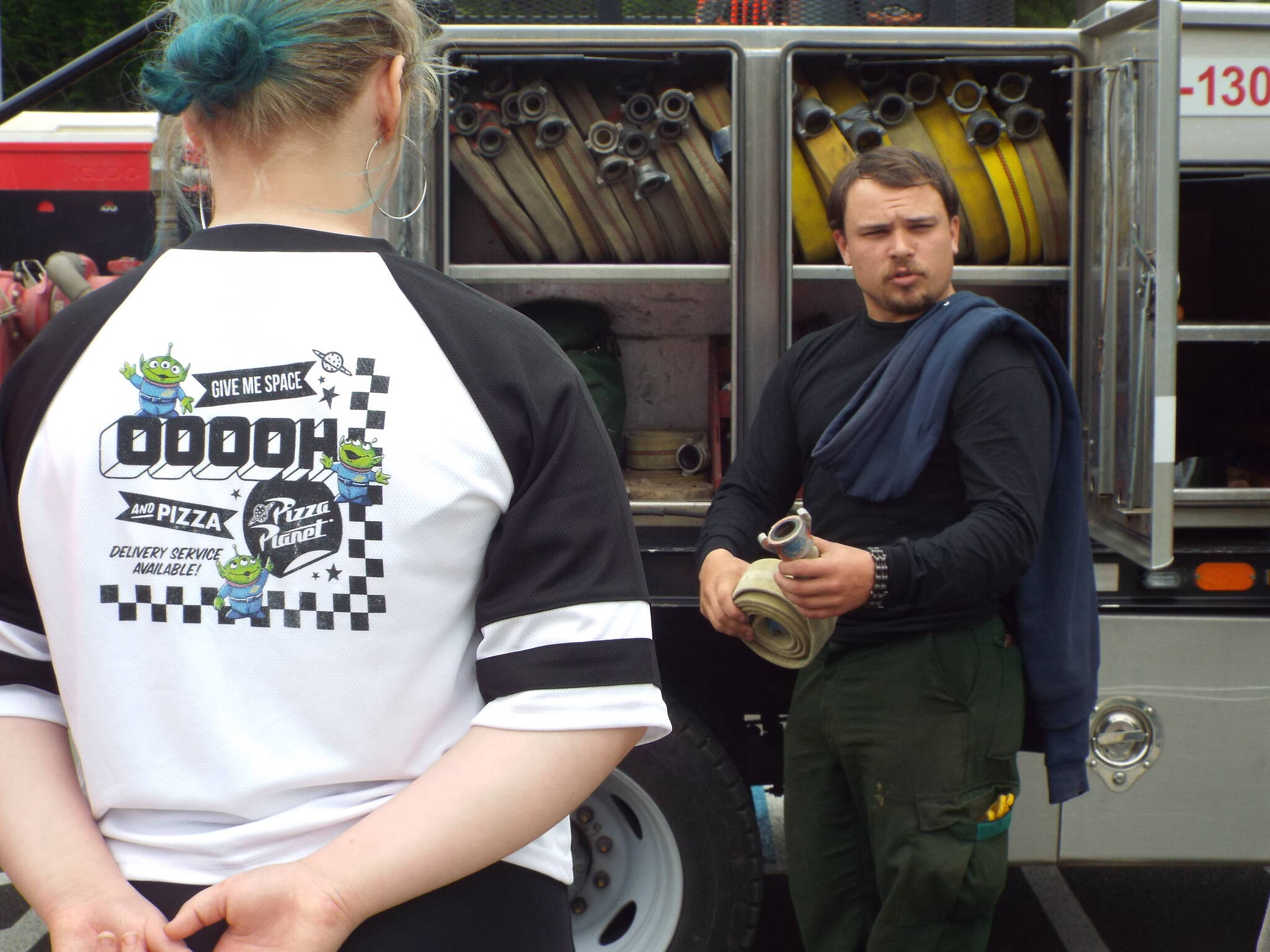Bright Futures in Forestry: Big Brothers Big Sisters Connect Aberdeen Youth to Green Careers

On June 4, a presentation on wildland fire careers and a visit by the crew with Washington State Department of Natural Resources’ (DNR) Central Park Station marked the last Big Brothers Big Sisters meeting of the school year.
Since December, three mentors, aka Bigs, and mentees, aka Littles, met once a month at Grays Harbor College for two hours to learn about forestry topics, such as forest health and wildfire, discuss forestry and natural resources careers and meet potential employers.
For four decades Big Brothers Big Sisters of Southwest Washington has served Pacific, Lewis, Thurston, and Lewis counties. With the hiring of Allianna Elgin as the program coordinator for Grays Harbor County in December, the organization could now offer its career workforce programming, and the first program focused on forestry.
“We saw a high need for forestry in this area,” said Nina Helsel, the site-based and career mentoring program manager with Big Brothers Big Sisters of Southwest Washington. “That’s what these high schoolers were wanting.”
Elgin, who was a student in the Aberdeen School District, said she joined the organization because, “I love Big Brothers Big Sisters and how I can help the community that I grew up [in].”
This inaugural year matched three Littles with three Bigs. The three Littles — Madison Winter, Kenyon Crawford and Cameron Libby — attend Aberdeen High School and will be seniors next year.
Crawford is interested in electrical engineering, and upon learning about the forestry program, decided to join.
“I learned a lot and learned that Sierra Pacific is also hiring for some electrical engineers so that’s currently what I want to do,” he said.
“I’ve actually been interested in forestry since December before my freshman year,” said Winter, adding, “I want to see what careers are available. I’m starting to get to the point where I’m going to be graduating soon, so I want to figure out where I want to go once I do graduate.”
The Bigs work with Sierra Pacific, Rayonier and DNR. Riley Mowry, a procurement forester with Sierra Pacific, learned of the program through his employer; Sierra Pacific, along with other companies, helped bring the Big Brother Big Sister forestry program to Grays Harbor County.
For why he decided to be a Big, Mowry shared, “I would have liked a program like this to be around when I was in high school. I’m helping give others an opportunity that I did not have.”
Emily Elfering, a harvest manager for Rayonier, heard about the program through a flyer being passed along at work.
“I thought it’s a really cool program. Thinking back when I was in high school, it would have been awesome to be able to hear from people in the industry and an opportunity to learn all the different disciplines you can go to within natural resources because there are quite a few options,” she said.
Brady Dier, the Little Rock Unit Manager with DNR, expressed a similar reason for why he volunteers: “[This] was a program I could have really benefited from when I was that age. I didn’t know that forestry was a career path at the time or how to get into wildland fire.”
Having completed basic fire training in 2015, his favorite wildfire memory is of spending 21 days camping in Alaskan wilderness.
Dier gave the presentation on wildland fire careers. Following the presentation, the group moved outside to see the wildland fire engine that the Central Park Station crew brought to campus. The crew walked the group through the design of the engine, the equipment, and the packs they carry in the field. Ruben Lacefield discussed the hoses and nozzles, while Robert Lacefield showed the chainsaws, and Casey Lacefield highlighted the different types of hand tools used on the line.
To Winter’s question of what the work schedule is for the crew, Lake Fitch, who has spent six seasons with DNR and is a qualified Incident Command 5 engine boss, said that during the start of the season, it’s slow for the crew and they work 8 a.m. to 4:30 p.m.
“As we progress on, we switch to seven-day coverage about after a month and a half to two months so we stagger our engines out so we constantly always have one engine on duty. Once we got our third round of fires on, we switch from 9:30 to 6. We stay in a little later throughout the day,” he said.
If the crew is called to be on a fire, their days may be 12-, 14- or 16-hour days, with a two to one, i.e. work 16 hours, get 8 hours off. For DNR, if they work 21 days, they get three days off for rest and recuperation.
As for whether they’ll be Bigs next year, all three Bigs said they plan to volunteer again. Elgin is actively recruiting Bigs and Littles for the forestry program for the upcoming 2025-2026 academic year, with the first meeting to be held in October. Littles are eligible if they are 15-21.
“As long as they’re in high school for the school year, they are more than willing to participate in this program,” she said.
Anyone who works in the forestry or natural resources industry are welcome to apply, and Elgin is hoping to expand to 10 matches.
If you are interested in serving as a mentor or enrolling your child into a Big Brother Big Sisters program, visit https://swwabigs.org/ to apply.
Post a Comment for "Bright Futures in Forestry: Big Brothers Big Sisters Connect Aberdeen Youth to Green Careers"
Post a Comment